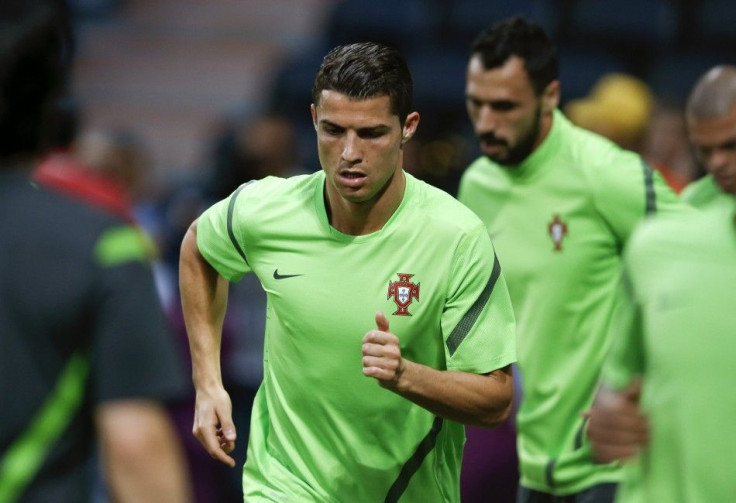Spain Vs. Portugal: Euro 2012 Semifinal Prediction, Preview; Ronaldo, Portuguese Counterattacking to be Controlled by La Roja

Many have tried. All have failed. On Wednesday, Portugal and Cristiano Ronaldo become the latest opponents to try and end Spain's four-year domination of the international soccer landscape.
Many believe it is Spain's Iberian neighbors together with their talisman that represent the ideal opposition to prevent La Roja becoming the first side to win three successive major tournaments.
But, of course, we have been here before. At the last World Cup Portugal met Spain in the round of 16 and put up feeble resistance that belied their narrow 1-0 defeat. An ultra-conservative Portugal under Carlos Queiroz left Ronaldo isolated, frustrated and making sure everyone knew it.
Since then a more expansive game plan has emerged under new coach Paulo Bento as they reached the Euro 2012 finals through the playoffs. In the opening game of the championships, though, Portugal appeared all-too wary of the threat posed by Germany and it wasn't until falling behind late on that they emerged from their shell.
For the remainder of that match and for much of the three games since Portugal has created chances aplenty and been one of the competition's most engaging sides.
Yet, both against the Netherlands and in the quarterfinal with the Czech Republic, Portugal began slowly. Almost as if it takes a wakeup call for them to get full value from their true stars Ronaldo and Nani.
The pair have the ability to destroy any team if afforded space on the break, but they need support in which to do so. At their worse Portugal all too often rely on Ronaldo being their entire offensive plan--get it to Ronaldo and he'll dribble form the halfway line, past the opposition defense and smash one in from 30 yards. It is exactly that reliance that leads to the pressure that so often has failed to see the Real Madrid star show his true form for the Seleccao das Quinas.
When taking on the Dutch and the Czechs, Portugal received ample encouragement from the former's woeful defense and from the latter's simple lack of quality. Against Spain there will be no such invitations and there must be doubts over Portugal's ability to attack with purpose against a side that intimidates more than any other in recent memory.
Spain have received a bizarre backlash in this tournament as accusations have been laid at their door of being both arrogant and boring. But both claims ignore the fact that Spain are trying to accomplish something miraculous in the game's history and time and again are facing sides that present them with rare obstacles.
There was much anticipation that the attacking talent at France's disposal would produce a true attractive showdown as they took on Spain in the quarterfinals. But like so many sides before them France ignored their own strengths in fear of the damage that Spain may do.
It led to arguably the most disappointing match of the tournament as France and their two right backs produced just a single shot on target-from a free-kick. It remains Italy's proactive approach in the opening match that has given Spain the toughest test in this tournament.
Spain rarely looked in danger of losing to France, but also far from overly exerted themselves in getting a 2-0 victory. The fact that they failed to get out of second gear means that any thought that the two days extra rest afforded Portugal can be written off as a factor.
In anticipation of Portugal playing with more of an emphasis on the opposition's strengths than their own, Vicente del Bosque is likely to continue with Cesc Fabregas as a false nine. The move represents a smart approach when playing against a deep-lying defense that nullifies Fernando Torres' pace in behind.
It is also, though, something of a defensive move in that allows Spain more control of the match. A factor that Del Bosque is likely to prioritize given the counter-attacking threat posed by Portugal. Spain's ability to nullify Ronaldo will also be helped by Alvaro Arbeloa's presence at right back. Sergio Ramos, who has occupied the role in Spain's two previous tournament wins, belies his breeding as a center back by becoming a marauding presence when given license to play on the outside. By contrast, Arbeloa is clearly a full-back with a defensive-first approach.
His deployment has been in part responsible for accusations that Spain are less attacking than in previous years--certainly against France a more offensive-minded right-back may have exposed Franck Ribery's lack of interest in tracking back. Against Portugal, though, Arbeloa may be truly appreciated up against his Real Madrid teammate.
Through their desire to control the game, Spain will not allow Portugal to be a consistent threat on the break. What's more Portugal's own tendencies will prevent Bento's side from forcing the issue until it is too late.
Spain 2-0 Portugal
© Copyright IBTimes 2024. All rights reserved.





















